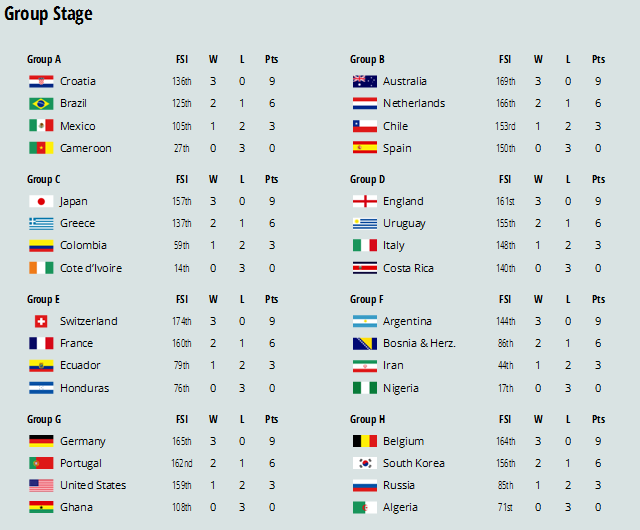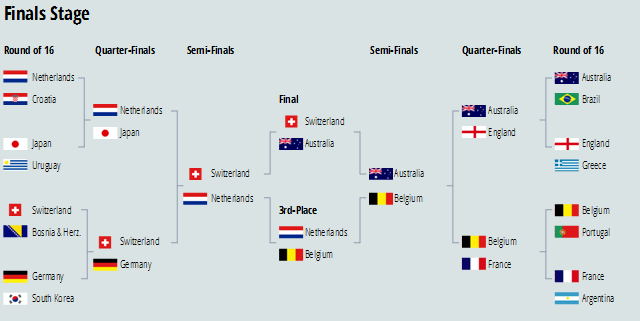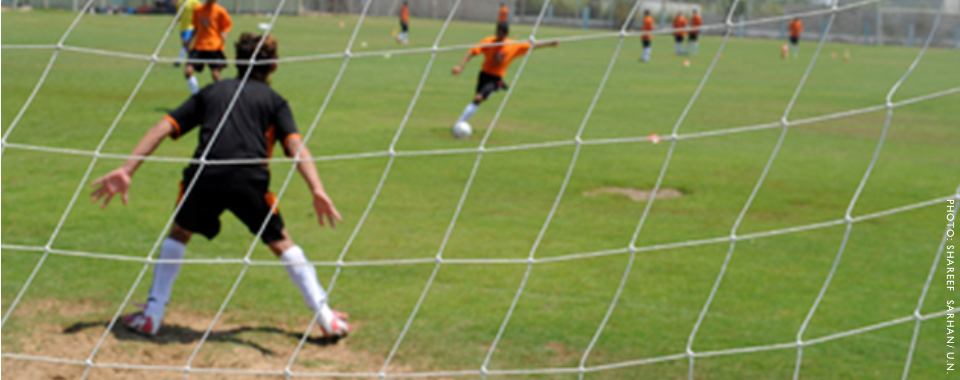BY J.J. Messner*
Fund for Peace – Global Square Blog
The Fragile States Index (FSI) is serious business, and it requires serious analysis and contemplation. Though the findings of the FSI should not be made light of, there is another pretty serious business going on right now: the World Cup. What if we combined these two themes? Is there any correlation between state fragility (or stability) and footballing proficiency? Could we predict the winner of the World Cup based on the FSI?
Well, obviously no. But it’s an interesting thought experiment nonetheless.
Though Finland did not qualify for the World Cup, it did “win” the FSI in 2014 as the world’s most Sustainable country. Unfortunately for the Finns, they were grouped with two recent Champions, France and Spain, in the European qualifying phase and did not progress to Brazil. So no correlation there. But it is interesting looking at which countries did actually qualify for the World Cup Finals. The only countries in the Alert category of FSI to qualify were Cote d’Ivoire (14th), Nigeria (17th), and Cameroon (27th). Indeed, 19 of the 32 countries competing are ranked as either Stable or Sustainable by the FSI, with Brazil just outside that categorization. (Since England competes separately to the rest of the United Kingdom in football, we’re giving England the benefit of the United Kingdom’s ranking. England: you’re welcome.) This could suggest that, though not being absolutely necessary, a certain level of wealth, development, and stability is necessary to have a national football program that is capable of supporting a team that can make it. Lacking that, it would appear that having plenty of raw talent that finds its way to European clubs is perhaps the next-best thing.

The Group stage match-ups, if we adjudicated every match based on who has the better FSI ranking, is a further demonstration of the randomness of the World Cup draw. The United States was not expected to progress far in the tournament given their drawing the “Group of Death” with Germany, Portugal, and Ghana. Though the Americans managed to surprise the skeptics and get through to the Round of 16 (where goal keeper Tim Howard nearly single-handedly defeated Belgium), based on FSI rankings, their group actually would have been the Group of Death, with Germany and Portugal progressing ahead of them. By far the most top-heavy group would have been Group B, where the worst-ranked country was Spain, at 150th. The weakest group was Group F, where Bosnia & Herzegovina, although the most-improved country of the decade managed to progress to the second stage despite being ranked 86th in the FSI.

The Finals stage counts as half-true — half of the quarter-finalists in the “FSI World Cup” are indeed quarter-finalists in the actual World Cup, namely Belgium, France, Germany, and the Netherlands. And of the countries that qualified for the Round of 16, the FSI pool had a similar strike-rate of 9 of the 16. Unfortunately, despite making it all the way to the FSI pool final, the Socceroos were unable to progress quite so far for Australia. And although they would win an FSI World Cup, the Swiss were of course desperately unlucky to be knocked out of the Round of 16 by Argentina. So of the teams remaining in the actual World Cup, FSI would predict a Dutch victory. Maybe we might not be so far off, after all?
* Marcela Aguirre contributed to this article.
